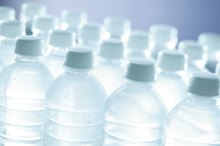Healthy Eating for a Teenage Athlete
Teenage athletes burn calories incredibly quickly. This is because their bodies are still rapidly growing while expending extra energy through sports activities. If a teenage athlete doesn’t eat enough or doesn’t eat the right types of nutrients, he risks decreased athletic performance and possible growth problems. Healthy eating allows a teen athlete to achieve his peak performance without compromising overall health.
Calories
If a teenager doesn’t take in enough calories, she will lose weight and their energy levels will decrease. Frequent snacking is an important way that teenage athletes can eat healthy, because it allows them to get in the extra calories they require.
Carbohydrates
Teenage Diet for Endurance Runners
Learn More
Carbohydrates are very important for teenage athletes because they are the main source of fuel for the body. KidsHealth.org states that fruits, vegetables and whole grains like brown rice, whole wheat bread and oatmeal, are healthy choices of carbohydrates because:
- they are rich in vitamins
- minerals
- fiber
Karen Bergs, a Registered Dietitian with Utah State University, recommends that teenage athletes get 60 to 65 percent of their calories from carbohydrates 2.** For example, if they eat 2,200 calories in a day, they should eat at least 330 grams of carbohydrates.
Protein
A teenage athlete needs protein because it helps strengthen the muscles. Utah State University recommends that teenage athletes consume 12 to 15 percent of their calories from protein, but they should not overdo the protein as eating too much protein may have harmful side effects like liver problems 2. Good sources of protein include:
- fish
- poultry
- dairy products
- nuts
- eggs
- soy products
- tofu
Fat
The Effects of Diet on Sports
Learn More
High-fat foods are often stereotyped as being unhealthy. Teenagers who are watching their weight usually try to avoid fat in their diet, but fat is an important nutrient and not to be skipped out on by the teen athlete. KidsHealth.org states that fats are used for long-lasting energy 1. They recommend eating healthy fats such as salmon, avocados, olive oil and nuts. Fats should make up 20 to 30 percent of a teenage athlete’s diet.
- High-fat foods are often stereotyped as being unhealthy.
- Fats should make up 20 to 30 percent of a teenage athlete’s diet.
Water
Though it’s not thought of as a nutrient, water is actually one of the most important nutrients there is. Teenage athletes are at risk for dehydration if they don’t continually drink water throughout their physical activity. KidsHealth.org states that when teenage athletes lose water through sweat, they can become weak and tired. It is recommended to drink water before and after exercise and every 15 to 20 minutes during exercise. There is not a specific amount of water that all teenage athletes need to drink as the amount required depends on the duration and intensity of the sport, as well as body weight. The most important thing is to drink water often.
- Though it’s not thought of as a nutrient, water is actually one of the most important nutrients there is.
- There is not a specific amount of water that all teenage athletes need to drink as the amount required depends on the duration and intensity of the sport, as well as body weight.
Related Articles
References
Writer Bio
Sarah Davis has worked in nutrition in the clinical setting and currently works as a licensed Realtor in California. Davis began writing about nutrition in 2006 and had two chapters published in "The Grocery Store Diet" book in 2009. She enjoys writing about nutrition and real estate and managing her website, RealtorSD.com. She earned her bachelor's degree in nutrition from San Diego State University.









